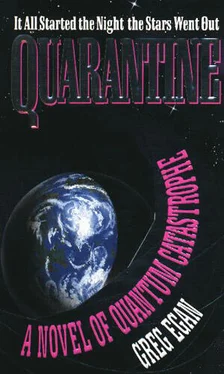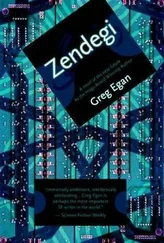Ten minutes later, Po-kwai emerges. 'Would you mind — if I sat out here for a while?'
'Of course not.'
'It's too late to go back to sleep, it's too early to eat breakfast; I don't know what to do with myself.' She brings out a second chair and sits, bent forward, still visibly agitated. I say, 'Maybe I should get you a doctor.'
'Don't be silly.'
'Tranquillizers — '
'Wow! I'm fine. I'm just not used to armed guards bursting into my room waving guns, that's all.' I start to apologize, but she silences me. 'I'm not complaining. I'm glad you're doing your job. It's just that I'm — finally — coming to terms with the fact that your job is necessary. They were perfectly frank at the interview, they explained precisely what the security arrangements would be; it's entirely my fault if I shrugged it off as paranoia.'
'But what's changed your mind? Me, overreacting? I'm sorry; I should have handled things more calmly. But you have no reason to feel besieged; the chances are that nobody outside of ASR even knows that the project exists.'
'Yeah. It's just… now that I know I'm not the control, now that the thing is actually working … and if I think about how much R&D investment I now … embody… ' She shakes her head. 'I got into this for the physics — I thought I'd be more of a collaborator, not just a guinea pig. Leung treats me like an idiot. Tse is an idiot. Lui treats me like some kind of fragile minor deity; I don't know what his problem is. And nothing's going to be published for years. This ought to be on the front screen of Nature tomorrow: role of the observer in qm confirmed — and modified!'
'Role of the —?'
'Observer. In quantum mechanics.' She looks at me as if I'd said something blatantly disingenuous, and then it dawns on her: 'They haven't even told you, have they?' She makes a noise of disgust and disbelief. 'Oh, yeah. Nick's just a bodyguard, just a minor flunkey — why should anyone bother to let him know what he's risking his life for?'
I shake my head. 'I'm not risking my life. And if I don't need to know, maybe it's better — '
'Oh, crap! I mean it.'
P3keeps me calm — but I can observe, dispassionately, a kind of spiritual vertigo building up inside me. I don't want to hear the Ensemble's secrets; I don't want to hear the final, worldly, explanation; I don't want to pierce the veil.
Primed, though, it's a remote and insubstantial panic; it doesn't belong to me. Primed, I'm content with a literal-minded obedience — and I've had no instructions to maintain my reverential ignorance. The quasi-mystical trappings with which I've embellished the Ensemble don't come from the loyalty mod itself, and the zombie boy scout has no need for them.
In any case, I have nochoice. Po-kwai says firmly, 'Just listen. The technicalities are messy, but the essentials are simple. Have you heard of the quantum measurement problem?'
'No.'
'What about Schrodinger's Cat?'
'Of course.'
'Well, Schrodinger's Cat is an illustration of the quantum measurement problem. Quantum mechanics describes microscopic systems — subatomic particles, atoms, molecules — with a mathematical formalism called the wave function. From the wave function, you can predict the probabilities of getting various results when you make measurements on the system.
'For example: suppose you have a silver ion, prepared in a certain way, passing through a magnetic field and then striking a fluorescent screen. Quantum mechanics predicts that half the time, you'll see a flash on the screen as if the ion veered upwards in the magnetic field, and half the time you'll see a flash as if it veered downwards. That can be explained by the ion having a spin, which makes it interact with the field; it gets pushed either up or down, depending on the way its spin is pointing, relative to the field. So by observing the flashes on the screen, you're measuring the ion's spin.
Or suppose you have a radioactive atom with a half-life of one hour. Point a particle detector at it which is wired up to a device which breaks a bottle of poison gas and kills a cat, if the atom decays. Enclose the whole set-up in an opaque box; wait an hour, and then look inside. If you do the experiment again and again — with a fresh atom and a fresh cat each time — quantum mechanics predicts that half the time, you'll find the cat dead, and half the time you'll find it alive. By seeing which it is, you'll have measured whether or not the atom has decayed.'
'So … where's the problem?'
'The problem is: before you make a measurement in either of these cases, the wave function doesn't tell you what the outcome is going to be; it just tells you that there's a fifty-fifty chance either way. But once you've made the measurement, a second measurement on the same system will always give the same result; if the cat was dead the first time you looked, it will still be dead if you look again. In terms of the wave function, the act of making the measurement has, somehow, changed it from a mixture of two waves, representing the two possibilities, to a "pure" wave — called an eigenstate — representing just one. That's what's called "the collapse of the wave function".
'But why should a measurement be special? Why should it collapse the wave function? Why should some measuring device — itself made up of individual atoms, all of which are presumably obeying the very same quantum mechanical laws as the system being measured — cause a mixture of possibilities to collapse into one? If you treat the measuring device as just another part of the system, Schrodinger's equation predicts that the device itself should end up in a mixture of states — and so should anything that interacts with it. The bottle of poison gas should end up described by a wave function which is a mixture of a broken state and an unbroken state — and the cat should end up as a mixture of a dead state and a living state. So why do we always see the cat in one pure state, dead or alive?'
'Maybe the whole theory's simply wrong.'
'No, it's not as easy as that. Quantum mechanics is the most successful scientific theory ever — if you take for granted the collapse of the wave function. If the entire theory was wrong, there'd be no such thing as microelectronics, lasers, Optronics,nanomachines, ninety per cent of the chemicals and pharmaceuticals industry … Quantum mechanics meets every experimental test that anyone's ever performed — so long as you assume that there's this special process called "measurement" — which obeys totally different laws from the ones that operate the rest of the time.
'So, the aim of studying the quantum measurement problem is to pin down exactly what a "measurement" is, and why it's special. When does the wave function collapse? When the particle detector is triggered? When the bottle is broken? When the cat dies? When someone looks in the box?
'One view is to shrug and say: quantum mechanics correctly predicts the probabilities of the final, visible results — and what more can you ask for? Atoms are only revealed through their effects on scientific instruments, so if quantum mechanics lets you calculate, precisely, what percentage of the time you'll get various instrument readings — or positions of flashes of light, or cat mortalities — you have a complete theory.
'Other people have tried to show that the wave function ought to collapse when the system reaches a critical size — or a critical energy, or a critical degree of complexity — and that any useful measuring device would be well over the threshold. People have invoked thermodynamic effects, quantum gravity, hypothetical nonlinearities in the equations… all kinds of things. None of which has ever quite explained the facts.
Читать дальше










